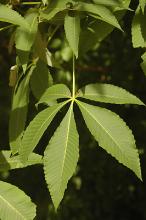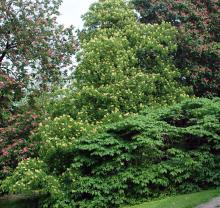Aesculus flava
Common name:
Yellow Buckeye
Sweet Buckeye
Pronunciation:
ES-ku-lus FLAH-va
Family:
Sapindaceae, Hippocastanaceae
Genus:
Synonyms:
Aesculus octandra
Type:
Broadleaf
Native to (or naturalized in) Oregon:
No
- Deciduous tree, oval to slightly spreading crown, often to 60-75 ft (18-23 m) tall. Leaves opposite to sub-opposite, palmately compound, 25-40 cm long, 5 (occasionally 7) elliptical leaflets, each 8-18 cm long, 2.5-7.5 cm wide, wedge-shaped base, long pointed tip, margin sharply serrate, dark green and glabrous above except on midrib, paler below; petiole as long or longer than a leaflet. Bark is dark brown and scaly rather than furrowed. Twig buds are large and non-resinous. Fall color may range from yellow to pale orange, some red. Flowers are pale to dark yellow, 2.5-4 cm long, in clusters 13-18 cm long; 4 petals, 7 stamens shorter than petals, styles longer than petals and curving upward. Fruit to about 6 cm long, husk pitted but without prickles, sub-spherical, leathery and tan, usually with 2 shiny brown seeds.
- Sun to partial shade, moist, well-drained soil; grows poorly on dry sites. Some consider it a much underutilized landscape tree.
- The seeds of Aesculus flava are reportedly poisonous; they are rich in saponins which are bitter and toxic, but poorly absorbed by the human body. The seeds may be leached of poisonous toxins and then eaten, these are said to be as "sweet as a chestnut". Native Americans roasted the nuts among hot stones, thus loosening the shells, peeled and mashed them, and then leached the meal with water for several days (Peatte, 1991, p. 481; Plant for a Future website, http://www.pfaf.org/index.html).
- Hardy to USDA Zone 3 (Snyder, 2000) Native range extends from Pennsylvania to Tennessee and northern Alabama and Georgia, west to Ohio and Illinois.
- flava: Latin, yellow; a reference to its flowers.








